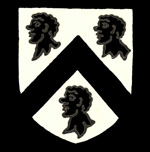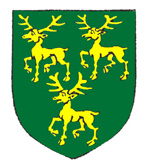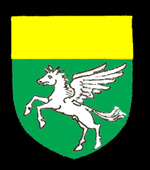The Manor of Britens alias Grove Houghton Conquest
Volume III of the Victoria County History for Bedfordshire was published in 1912 and contains details of the manors of Houghton Conquest. The Manor of Britens alias Grove had its origins in five hides ascribed to Hugh de Beauchamp in the Domesday Book of 1086. By about 1240 the manor was held by William Briton and had 1½ hides. The manor remained in the family until the death of John Briton in 1390 when it descended to his sister Margaret, wife of William Wenlock.

Wenlock family arms
The son of William and Margery was Sir John Wenlock, member of parliament for Bedfordshire from 1433 to 1449. Originally a supporter of Henry VI (1422-1461 and 1470-1471) he decided to change sides after the victory of Edward IV (1461-1470 and 1471-1483) at the Battle of Northampton. His reward was to be created 1st Baron Wenlock in 1467. Later, however, he turned his coat again and was killed at the Battle of Tewkesbury in 1471 fighting for Henry VI. A helmet said to be his is preserved in Saint Mary’s church in Luton. His estates were forfeited to the victorious Edward.

Rotherham family arms
In 1477 the manor, with other property, was granted to Luton’s Thomas Rotherham, Archbishop of York and the manor remained in the Rotherham family until 1568 when George Rotherham alienated the manor to Thomas Clarke of Stevenage [Hertfordshire]. The last of the Clarkes was Sir Francis whose daughter succeeded him in the mid-17th century. She was married to Sir Edmund Wylde. The Wylde family held the manor until the early 18th century as by 1742 it was in the hands of Thomas Hurley who, in his will of that year, left it to his brother-in-law Isaac Hughes. Hughes sold the manor to John Potter, Archbishop of Canterbury.

MacQueen family arms
The Potter family held the manor until Thomas Potter died childless and it passed to his half-sister, wife of Malcolm MacQueen who held it by 1810. In 1820 MacQueen alienated the manor to Thomas Mills and Robert Campbell. By the 20th century the land was in the possession of F J Thynne. The manor may have ceased to operate by this time but certainly in the 1920s a succession of Law of Property Acts effectively abolished manors in all but name.